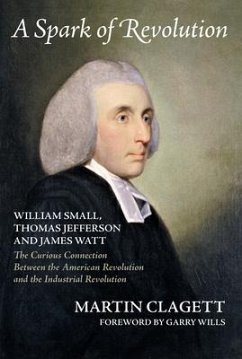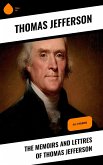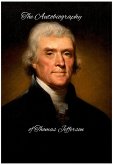The story of William Small's life is exceptional in that it is as much a quest as it is a biography. Although Small had profound influences on Thomas Jefferson as his mentor and only professor, on James Watt as his promoter and collaborator on the steam-engine, on Matthew Boulton, as an advisor and partner to the first great industrial giant, and although he has been mentioned in past studies only as a fleeting and evanescent footnote scurrying off the bottom of the page, Small was something much more. He was the thread that bound together elements of the School of Common Sense, the Declaration of Independence, the American Revolution, and the production of the steam-engine; he was the projector of science and the Scottish Enlightenment in the universities of colonial America.
He introduced Thomas Jefferson to his first views of the expansion of science & of the system of things in which we are placed; Small instructed a cadre of pre-Revolutionary students in the logic of Newton and the philosophy of the improvement of mankind; he assisted and advised the ever ambitious Matthew Boulton in respect to scientific flexibility and technological modernization; he promoted and collaborated with James Watt on that instrument of economic, social and political change-the practical steam-engine. Small was the magnet, the generator and the intellectual glue that both drew in and held together -by dint of the gravitational pull of his personality and the disinterested nature of his character-men of science, industry, medicine, and politics to form one of the most diverse and transformative scientific communities of the eighteenth century-the Birmingham Lunar Society.
More extraordinary than the far-flung and intimate connections that Small maintained with some of the most influential men of the eighteenth century, more remarkable than his impact on the social, political and economic transitions rapidly taking place in the era of enlightenment, more unexpected than his transcontinental connections and influence, is the fact, until this investigation, no detailed or even cursory study on the complete life of Small has ever been undertaken. The difference in this narrative is that it is as much a mystery being solved as it is a story being told; that this new look at Small's life and of the ramifications of his aggregate auctoritas is derived chiefly from primary rather than secondary sources-and therefore is less likely to be the source of error, conjecture or opinion.
He introduced Thomas Jefferson to his first views of the expansion of science & of the system of things in which we are placed; Small instructed a cadre of pre-Revolutionary students in the logic of Newton and the philosophy of the improvement of mankind; he assisted and advised the ever ambitious Matthew Boulton in respect to scientific flexibility and technological modernization; he promoted and collaborated with James Watt on that instrument of economic, social and political change-the practical steam-engine. Small was the magnet, the generator and the intellectual glue that both drew in and held together -by dint of the gravitational pull of his personality and the disinterested nature of his character-men of science, industry, medicine, and politics to form one of the most diverse and transformative scientific communities of the eighteenth century-the Birmingham Lunar Society.
More extraordinary than the far-flung and intimate connections that Small maintained with some of the most influential men of the eighteenth century, more remarkable than his impact on the social, political and economic transitions rapidly taking place in the era of enlightenment, more unexpected than his transcontinental connections and influence, is the fact, until this investigation, no detailed or even cursory study on the complete life of Small has ever been undertaken. The difference in this narrative is that it is as much a mystery being solved as it is a story being told; that this new look at Small's life and of the ramifications of his aggregate auctoritas is derived chiefly from primary rather than secondary sources-and therefore is less likely to be the source of error, conjecture or opinion.
Dieser Download kann aus rechtlichen Gründen nur mit Rechnungsadresse in A, D ausgeliefert werden.









